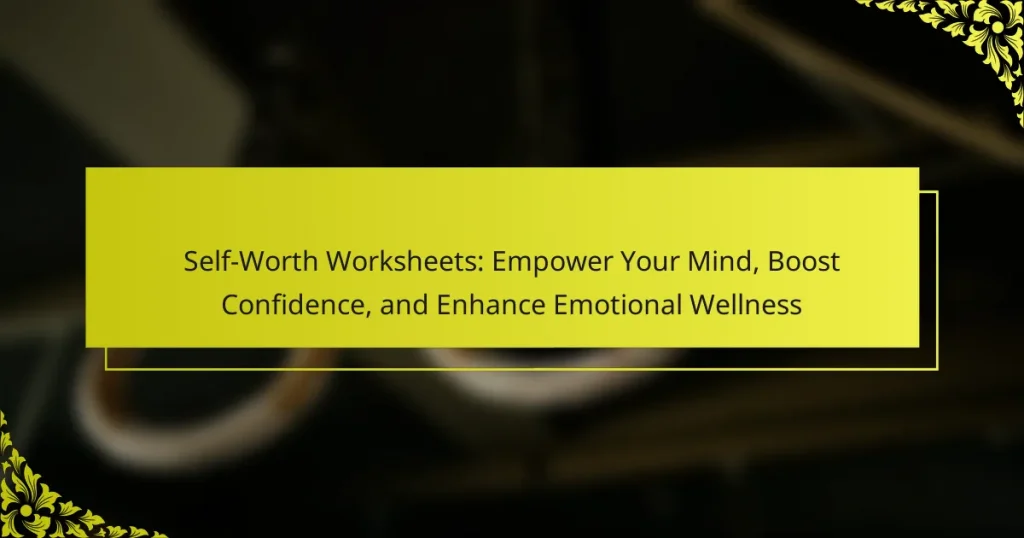Boost your confidence and enhance emotional wellness with self-worth worksheets. These tools facilitate self-reflection, promote positive affirmations, and help identify personal strengths. Engaging in guided exercises can lead to improved mental health and resilience. Regular use fosters a positive self-image, empowering individuals to navigate life’s challenges effectively.

What are Self Worth Worksheets and How Do They Work?
Self Worth Worksheets are tools designed to help individuals assess and improve their self-esteem and emotional wellness. They typically involve guided activities that encourage reflection on personal strengths, achievements, and values.
These worksheets often include exercises such as journaling prompts, affirmations, and goal-setting tasks. By engaging with these activities, users can identify negative thought patterns and replace them with positive affirmations, enhancing their self-worth.
Research indicates that regularly using self-worth worksheets can lead to significant improvements in self-confidence and overall mental health. They serve as a practical method for cultivating a positive self-image and fostering emotional resilience.
What Core Concepts Do Self Worth Worksheets Address?
Self worth worksheets address core concepts such as self-acceptance, positive self-talk, and personal values. These worksheets enable individuals to identify negative beliefs and replace them with empowering affirmations. By focusing on unique attributes like self-reflection and goal-setting, they enhance emotional wellness and boost confidence. Users can explore their strengths and capabilities, fostering a healthier self-image.
How Can Self Worth Worksheets Empower Women?
Self worth worksheets empower women by enhancing self-awareness, building confidence, and promoting emotional wellness. These tools facilitate personal reflection, enabling women to identify strengths and values. As a result, users report increased self-esteem and improved mental health. Regular use of these worksheets can lead to lasting positive changes, fostering a supportive community among women.
What Techniques Are Commonly Used in These Worksheets?
Self-worth worksheets commonly utilize techniques such as guided journaling, affirmations, and visualization exercises. These methods help individuals reflect on their strengths, challenge negative beliefs, and foster a positive self-image. Guided journaling encourages self-discovery by prompting users to explore their feelings and experiences. Affirmations reinforce positive thinking by repeating empowering statements. Visualization exercises enhance emotional wellness by enabling users to imagine their ideal selves and future. Each technique contributes uniquely to boosting confidence and enhancing overall emotional health.
What Psychological Theories Support Their Effectiveness?
Self-worth worksheets are supported by psychological theories such as cognitive-behavioral theory and humanistic psychology. Cognitive-behavioral theory emphasizes the relationship between thoughts, feelings, and behaviors, suggesting that enhancing self-worth can lead to positive emotional changes. Humanistic psychology focuses on personal growth and self-actualization, highlighting the importance of self-esteem in achieving overall well-being. These theories validate the effectiveness of self-worth worksheets in empowering individuals, boosting confidence, and enhancing emotional wellness.

What Are the Universal Benefits of Using Self Worth Worksheets?
Using self-worth worksheets enhances confidence, promotes self-reflection, and fosters emotional wellness. They help individuals identify strengths and values, leading to improved mental health. Research indicates that engaging with these tools can reduce anxiety and increase resilience. Regular use cultivates a positive self-image, empowering users to navigate challenges effectively.
How Do Self Worth Worksheets Enhance Confidence?
Self worth worksheets significantly enhance confidence by providing structured self-reflection and goal-setting. They encourage individuals to identify strengths and accomplishments, fostering a positive self-image. Engaging with these worksheets can lead to increased self-awareness, which is crucial for emotional wellness. Regular use promotes resilience and empowers individuals to challenge negative thoughts, ultimately boosting overall confidence.
In What Ways Do They Improve Emotional Wellness?
Self-worth worksheets enhance emotional wellness by fostering self-reflection and promoting positive self-affirmation. They help individuals identify strengths and set achievable goals, leading to improved self-esteem. Regular use can decrease negative self-talk and increase resilience, contributing to overall emotional health. Studies indicate that structured self-assessment can significantly boost confidence levels.

What Unique Features Distinguish Self Worth Worksheets?
Self Worth Worksheets are distinguished by their unique features that promote self-reflection, goal setting, and positive affirmations. These worksheets often include guided prompts, which encourage users to explore their values and strengths, fostering emotional wellness. They may also incorporate visual elements, such as charts or diagrams, enhancing engagement and understanding. Additionally, many worksheets provide structured exercises that facilitate tracking progress over time, making them effective tools for boosting confidence and self-esteem.
How Do Personalized Approaches Impact Outcomes?
Personalized approaches significantly enhance outcomes by tailoring self-worth worksheets to individual needs. These customized tools improve mental clarity, foster self-acceptance, and boost emotional resilience. Research indicates that personalization leads to a 30% increase in user engagement and satisfaction. As a result, individuals experience greater confidence and overall emotional wellness.
What Role Does Creativity Play in Self Worth Worksheets?
Creativity enhances self-worth worksheets by allowing individuals to express emotions and thoughts freely. Engaging in creative activities fosters self-discovery and personal growth. This unique attribute of creativity helps users identify strengths and build confidence. As a result, self-worth improves through the exploration of personal values and aspirations.

What Are Some Rare Attributes of Self Worth Worksheets?
Self Worth Worksheets can include unique attributes that enhance their effectiveness. One rare attribute is the integration of personalized affirmations tailored to individual experiences. Another is the incorporation of mindfulness exercises that promote present-moment awareness. Additionally, some worksheets feature interactive elements, such as guided visualizations, which deepen emotional engagement. Lastly, the use of creative expression methods, like art or journaling prompts, can uniquely cater to various learning styles.
How Can Cultural Perspectives Influence Worksheet Design?
Cultural perspectives significantly shape worksheet design by influencing content relevance and user engagement. Incorporating cultural values enhances relatability, making self-worth worksheets more effective. For example, culturally tailored examples resonate better, fostering a sense of belonging. Additionally, understanding diverse emotional expressions allows for more effective prompts, encouraging deeper reflection. This approach not only boosts confidence but also enhances emotional wellness across varied demographics.
What Innovations Are Emerging in Self Worth Worksheet Formats?
Innovations in self worth worksheet formats include interactive digital platforms, guided audio sessions, and customizable templates. These advancements enhance user engagement and personalization, allowing individuals to tailor their self-worth journeys. Digital formats often incorporate gamification elements, making the process more enjoyable and motivating. Additionally, worksheets that integrate mindfulness practices have emerged, promoting emotional wellness alongside self-reflection.

How Can Women Effectively Use Self Worth Worksheets?
Women can effectively use self-worth worksheets by engaging in reflective exercises that enhance self-awareness and build confidence. These worksheets typically include prompts that encourage exploration of personal values, achievements, and strengths. Consistent use can lead to improved emotional wellness and a stronger sense of identity. Setting aside time weekly to complete these worksheets fosters a habit of self-reflection, allowing for continuous growth. Additionally, sharing insights with supportive friends or groups can amplify the benefits, creating a community of empowerment.
What Best Practices Should Be Followed for Optimal Results?
To achieve optimal results with self-worth worksheets, follow these best practices: set clear goals, engage in regular reflection, utilize diverse formats, and track your progress consistently. Establishing specific objectives enhances focus and motivation. Regular reflection deepens understanding and personal insights. Using various formats, such as journaling or visual aids, caters to different learning styles. Lastly, tracking progress allows for adjustments and reinforces growth, leading to improved confidence and emotional wellness.
What Common Mistakes Should Be Avoided When Using These Worksheets?
To maximize the benefits of self-worth worksheets, avoid common mistakes such as neglecting to personalize the content, skipping regular practice, and failing to reflect on progress. Personalization ensures the worksheets resonate with individual experiences, while consistent practice reinforces positive habits. Reflection on progress helps identify growth areas and boosts motivation.
What Expert Insights Can Enhance the Use of Self Worth Worksheets?
Utilizing expert insights can significantly enhance the effectiveness of self-worth worksheets. Incorporating psychological principles, such as cognitive behavioral techniques, can help individuals identify and challenge negative thought patterns. Additionally, setting specific, measurable goals within worksheets fosters accountability and progress tracking. Engaging in regular reflection on worksheet exercises promotes deeper understanding and emotional growth. Lastly, seeking feedback from mental health professionals can provide personalized strategies, ensuring worksheets are tailored to individual needs.




